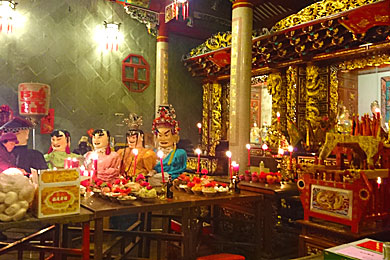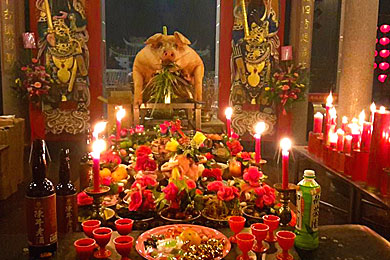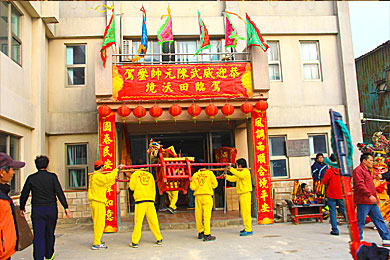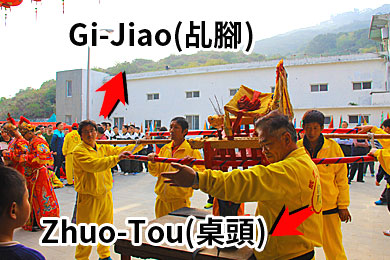Bei-Man Feast
Bei-Man is a leading activity in Xiju. The streets are all decorated with lanterns, and the place re echoed with the sound of gongs, drums and firecrackers. Gods and people all enjoy this feast happily together.
Shang Cai Ming (上彩暝)
People who live in eastern Fujian, like Fuzhou, Changle and Lienchiang, place a lot of importance on Lantern Festival. They hold a ceremony called “Shang Cai Ming (上彩暝)” on the day before Lantern Festival, this is the begging of Bei-Man Feast and it is very important to the villagers.
Bei-Man
“Bei-Man” means to worship at night time. The feast usually starts at the time when the god Marshal Chen comes for a visit and the temple is piled with dishes brimming with auspicious symbolism.
There are some examples: the characters “fish (魚)” and “surplus (餘)” are homonyms, so a fish dish represents the expression “nian nian you yu (年年有餘)” or “every year a surplus”; “mandarin(橘)” and “lucky (吉)” sound alike, so it signifies “da ji da li (大吉大利)” which means great fortune; “cake (糕)” and “high (高)” sound the same, so eating niangao (年糕, new year cake) symbolizes “bu bu gao sheng (步步高升)” or “step by step ever higher.”
There would also some red candles which represents happy event. Every family hang lanterns on their door and children will go for new year greeting with traditional lanterns from house to house. If you see in detail, you will find out three is a character “Xi (囍)” on the lantern, it means that family just hold a wedding last year and they hope they can get a new born baby soon.

Red candles and red flowers are very important decoration in religious ceremonies.

People prepared a whole pig and lots of other food as offerings to god.
Gong-Gi(扛乩)
Gong-gi is a ceremony that the followers invite the god to sit on the sedan chair and ask the god some questions for solutions or answers. It needs a team to work together, people who carry the sedan chair called "Gi-Jiao (乩腳)", these people are the messenger of the god. A senior messenger, known as "Zhuo-Tou (桌頭)," explain the messages from god for people.

Four Gi-Jiaos are carrying god's sedan chair.

Four Gi-Jiaos and a Zhuo-Tou.
Resource : Yamamoto Legion